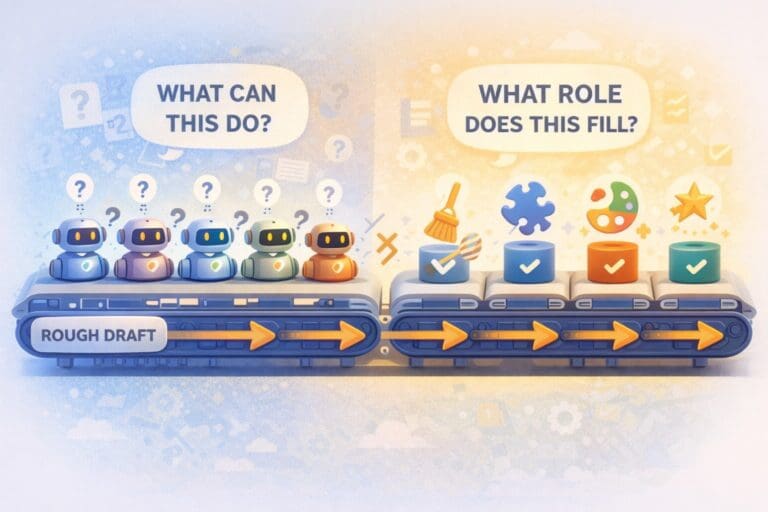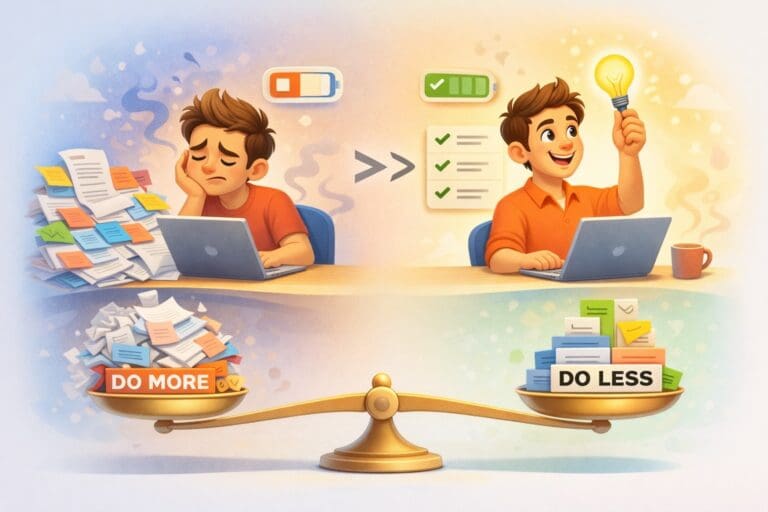Key lessons from having the right guidance
Standing in front of my team during a critical project review, I froze. Despite years of experience as a project manager, I realized I was operating at my limit. My strategies weren’t scaling, my leadership needed refinement, and my professional growth had plateaued.
That moment became the catalyst for seeking out mentorship – a decision that would reshape not just my career trajectory, but my entire approach to professional development.
As both a project manager at a digital agency and someone building my own business ventures, I’ve experienced firsthand how the right mentor can accelerate growth in ways that would take years to achieve alone.
What I didn’t expect was how mentorship would transform areas beyond just career advancement.
The right mentor makes all the difference
The most effective mentorship isn’t just about finding someone more experienced. It’s about finding someone who has successfully navigated the specific challenges you’re facing. This could mean:
- A technical expert who helps refine your strategic decision-making
- A seasoned manager who guides your leadership development
- An industry veteran who shares insights on career progression
- A successful entrepreneur who helps avoid common pitfalls
Would you like to share a specific example of a mentorship relationship that has impacted your career? This would help illustrate these points with a real-world scenario.
In its absence, I can say that studies by MentorcliQ have shown that employees who received mentoring were promoted five times more often than those who didn’t. Additionally, mentored employees had a 23% higher retention rate than their non-mentored peers.
Finding your ideal mentor match
The process of finding the right mentor requires careful consideration. Rather than reaching out to anyone with more experience, successful mentorship often starts with:
- Clearly defining your current challenges
- Identifying specific areas where you need guidance
- Looking for mentors who have overcome similar obstacles
- Ensuring there’s alignment in communication styles and expectations
The key is to approach potential mentors with clarity about what you hope to learn and how you can make the relationship valuable for them as well.
What effective mentorship looks like in practice
Professional mentorship goes far beyond casual coffee meetings or occasional advice. The most impactful mentoring relationships are structured, intentional, and focused on measurable growth.
The foundation of successful mentorship
The most successful mentor-mentee relationships are built on three core elements:
- Clear expectations and boundaries
- Regular, scheduled interactions
- Actionable feedback and accountability
A study by Olivet Nazarene University found that 61% of successful mentoring relationships meet at least every two weeks, with each session lasting between 30 minutes to an hour. This regular cadence allows for consistent progress tracking and timely guidance on emerging challenges.
Making every session count
Effective mentorship sessions typically follow a structured format while maintaining enough flexibility to address urgent issues. A productive session often includes:
- Updates on progress since the last meeting
- Discussion of current challenges and obstacles
- Exploring potential solutions and approaches
- Setting clear actions for the next two weeks
- Scheduling the next check-in
The most valuable mentors don’t just give advice – they ask probing questions that help mentees develop their own problem-solving abilities. This approach builds long-term capability rather than creating dependency on the mentor’s guidance.
Measuring mentorship impact
According to a study by Gartner, measuring the impact of mentorship can be done across three key areas:
- Career progression metrics (promotions, salary increases)
- Skill development benchmarks
- Confidence and decision-making ability
Organizations with formal mentorship programs report that mentored employees are 20% more likely to get a raise and six times more likely to be promoted to a higher position.
Three areas where mentorship drives real transformation
The impact of mentorship extends beyond just career advancement. Data from organizations with established mentorship programs highlights three distinct areas where mentorship consistently creates measurable change.
Technical skill acceleration
While online courses and documentation help build foundational knowledge, mentorship accelerates technical growth in unique ways. According to research by Sun Microsystems, employees who received mentoring were 23% more likely to solve complex technical problems independently.
Good technical mentors provide:
- Context for when to apply different approaches
- Real-world examples of common pitfalls
- Frameworks for decision-making under pressure
- Shortcuts and efficiency techniques that aren’t documented
Leadership development
A study by DDI World found that 67% of businesses reported an increase in productivity due to mentoring. More specifically, mentored employees demonstrated marked improvements in:
- Team communication effectiveness
- Strategic decision-making
- Conflict resolution
- Resource allocation
- Stakeholder management
These improvements often appear within the first six months of mentorship, showing how guidance can rapidly accelerate leadership capabilities.
Business acumen and strategic thinking
Perhaps the most significant transformation occurs in business and strategic thinking. According to Deloitte’s research on mentorship programs:
- 91% of mentored employees developed stronger business strategies
- 88% became more proficient in identifying market opportunities
- 84% improved their ability to navigate organizational politics
This heightened business acumen often translates directly into better project outcomes and career advancement opportunities.
The key to these transformations isn’t just the mentor’s knowledge – it’s their ability to help mentees see blind spots and challenge assumptions. A good mentor acts as both a mirror and a window, reflecting current capabilities while showing what’s possible with continued growth.
Creating your mentorship roadmap for 2025
Having established the transformative potential of mentorship, let’s focus on actionable steps to build mentoring relationships that drive real results. Based on successful mentorship programs at leading organizations, here’s a practical framework for getting started.
Identifying the right mentorship type
Different career stages and goals require different types of mentorship. According to research by MentorCruise, the most effective mentoring relationships align with specific development needs:
- Skill-based mentoring: Focused on mastering specific technical or professional capabilities
- Career guidance: Centered on navigating career transitions and advancement
- Leadership development: Aimed at building management and leadership abilities
- Industry-specific mentoring: Providing insights into particular market segments or business types
The key is selecting the type that matches your current primary growth area.
Preparing for mentorship
Before seeking a mentor, successful mentees typically:
- Document specific challenges they want to address
- Set clear, measurable goals for the relationship
- Research potential mentors’ backgrounds and expertise
- Prepare questions about the mentor’s experience and approach
This preparation demonstrates seriousness and helps make the most of initial conversations with potential mentors.
Building the relationship
The Wharton School of Business studied successful mentoring relationships and found they typically progress through these phases:
- Initial connection and establishing trust
- Setting expectations and boundaries
- Regular knowledge sharing and feedback
- Evolving the relationship as needs change
- Transitioning to peer relationship
Each phase requires different approaches and expectations from both parties.
Taking action
To begin your mentorship journey:
- Identify your primary development needs
- Research potential mentors in your network or industry
- Prepare a clear outline of what you hope to achieve
- Make initial connections through mutual contacts or professional networks
- Start with a trial period to ensure mutual fit
Mentorship is an investment in your future that compounds over time. With proper preparation and commitment, it can accelerate your professional growth far beyond what’s possible through self-directed learning alone.
Making mentorship work for you
Effective mentorship isn’t about finding a career superhero who will solve all your professional challenges. It’s about building relationships that provide guidance, challenge your thinking, and help accelerate your growth through shared experience and wisdom.
The data is clear – professionals with mentors advance faster, make better decisions, and navigate organizational challenges more effectively. But these benefits only materialize when you approach mentorship with intention and commitment.
Take the first step today by reflecting on your current challenges and growth areas. Whether you’re looking to enhance technical skills, develop leadership capabilities, or navigate career transitions, there’s a mentor out there who has walked a similar path.
Consider joining professional organizations in your industry, attending industry events, or exploring formal mentorship programs at your organization. The investment in finding and nurturing the right mentoring relationship could be the catalyst that propels your career forward.
I’m curious about your experiences with mentorship. Have you had a mentor who significantly impacted your professional development? What made that relationship particularly valuable?
Share your thoughts in the comments below or reach out to discuss your mentorship journey. The insights you share could help others take their first steps toward finding the right mentor.






